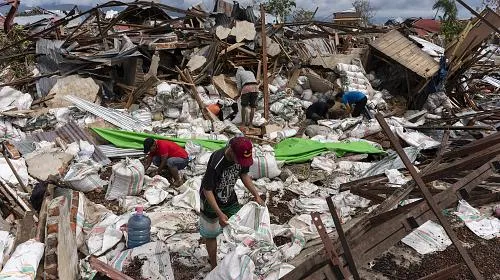JAKARTA (October 26, 2018) — One month after a terrible earthquake and tsunami hit the Indonesian island of Sulawesi the onset of the rainy season has increased the suffering for many survivors. The arrival of the rains is likely to see an increase in diseases like malaria and dengue fever, and further contamination to already polluted water sources.
“One month on, and while most places have now received some form of support, large numbers of people are still living on roadsides without adequate shelter,” said Helen Vanwel, CARE Indonesia Country Director. “The government has worked quickly and tirelessly to assist survivors, but there is still a way to go in making sure the people in Central Sulawesi have all the basic items they need, let alone being able to rebuild their lives and livelihoods.”
“On top of all the damage and destruction caused by the tsunami, the rainy season has now begun in earnest, and cases of disease outbreak are rapidly rising,” she added. “There remain pools of stagnant water in many areas, which are breeding grounds for diseases like malaria and dengue fever. With many people still living in the open, mothers in particular, are worried about shielding their children from the increasing number of mosquitos.”
Shelter from the rain and access to clean drinking water remain two major priorities for survivors of the tsunami and earthquake. In particular, high levels of E. coli contamination have been found in water sources, making access to clean drinking water an ongoing problem. CARE has already reached over 5,000 people with hygiene kits which include much-needed sanitary napkins.
CARE aims to reach around 50,000 people going forward with a first wave of basic emergency items like kitchen sets, hygiene materials and tarpaulins for temporary shelters. CARE will also focus on supporting people to rebuild as soon as possible and provide cash assistance to allow them to reinvest in livelihoods activities and reconstruction of their homes. In order to do this, CARE aims to raise $15 million.
Making sure women’s voices are heard and their specific needs are met is a priority for CARE in its work with survivors of the tsunami. Women’s responsibility for the care of others, and their domestic roles, means it is harder for them to advocate for their needs. Ensuring safe spaces for women and girls so they have access to accurate information, support services, and the opportunity to express their particular needs is central to CARE’s response.
“Women have told us that inadequate toilets, a lack of privacy, a lack of lighting, and toilets being too far from shelters, particularly at night, are some of their major concerns,” Vanwel says. “Insuring the safety, dignity and privacy of women and girls in their everyday lives, including in shelters and in sanitary facilities, drives CARE’s commitment to women and girls in this, and every, emergency.”
About CARE:
Founded in 1945, CARE is a leading humanitarian organization fighting global poverty. CARE has more than seven decades of experience helping people prepare for disasters, providing lifesaving assistance when a crisis hits, and helping communities recover after the emergency has passed. CARE places special focus on women and children who are often disproportionately affected by disasters. Last year, CARE worked in 94 countries to reach 80 million people, including more than 11 million through emergency response and humanitarian aid. To learn more, visit www.care.org
Media Contact:
Nicole Harris, 404-735-0871 nharris@care.org

